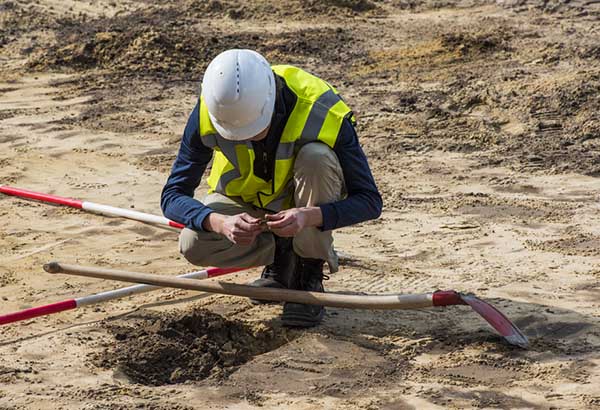
An Intensive 5-day Training Course
Petroleum Geology for Non-Geologists
The Basics of Petroleum Geology Concepts and Processes for
Technical & Non-Technical Professionals in the Oil & Gas Industry
Would an alternative date be more suitable?
We offer a variety of tailored training options, customized to meet your organisation's needs. Delivered anytime, anywhere, we make it easy to bring expert training directly to your team.
Why Choose this Training Course?
The oil industry from upstream to downstream is a multi-faceted industry and a broad shop employing everyone from administrative staff to accountants, lawyers, chemists, production technologists, health and safety officers through to procurement, business economists and pilots. But its life blood is first finding and then producing commercial quantities of oil, and this starts with an understanding of the geology.
Anyone who is employed in the oil industry should have a basic understanding of this quest to find oil, how it starts, what the fundamentals are and what the exploration geologist is looking for to make a discovery. They should also be aware of the risks involved and what the geologist does to minimize these. When that commercial oil field has been found and is being produced, it is also necessary to have a basic understanding of how the geology influences the fundamentals of oil and gas production rates, water saturations and ultimately the oil field life upon which all these jobs depend.
This 5-day interactive training course and workshop has been designed to provide a high impact and holistic learning experience which will allow the non-technical staff members to understand the objectives and aims of a Petroleum Geoscientist in his quest to find and replace oil reserves for the company. Through understanding comes improved communication and enhanced team and company performance.
This training course will feature:
- An introduction to geology
- The fundamental elements of the petroleum system
- New ventures and what the geologist is looking for
- Exploration from area of interest through to drillable prospect & how a prospect is defined
- Discovery through to appraisal and field development
- Key aspects of the petroleum geology that can affect producibility and therefore commerciality
What are the Goals?
By the end of this training course, participants will have learnt:
- The key elements of a petroleum system are, from hydrocarbon source to reservoir and seal
- Basin analysis, regional geology and play based exploration techniques
- The different sorts of hydrocarbon trap from structural to stratigraphic
- A basic understanding of how a prospect is defined and risked
- How seismic, existing well information and outcrop geology can be used for exploration
- How understanding of the petroleum geology allows a discovery to be appraised and then developed
Who is this Training Course for?
This training course is suitable to a wide range of professionals who work in the oil and gas industry. It would most greatly benefit functions that have some interaction with the subsurface departments in an oil company but don’t have any technical background in petroleum geology, which includes but is not exclusive to:
- Lawyers
- Contracts staff
- Administrative Support including IT
- Economists and Finance staff
How will this Training Course be Presented?
This PetroKnowledge training course will be based around PowerPoint presentations for each module followed by interactive and participative individual and team exercises. There will also be workshop sessions based around real exploration and development examples to get participants to actively become aware of the critical role that an understanding and interpretation of the geology and the petroleum system plays in the oil industry. Some geological risking games will be undertaken so that participants can get an idea of how the risk element combined with exploration costs can lead to strategic decisions being made when a prospect portfolio is presented for drilling out.
Daily Agenda
Day One: An Introduction to Petroleum Geology
- An introduction to Geology
- The fundamental elements of the petroleum system
- Hydrocarbon source rocks, generation and migration
- Conventional hydrocarbon reservoirs clastic and carbonate
- Unconventional hydrocarbon reservoirs
- Hydrocarbon seal and seal capacity
Day Two: Sedimentary Basins and the Petroleum System
- What is a sedimentary basin
- Basin analysis and regional geology
- Different basin types, extensional and compressional
- Hydrocarbon plays and play based exploration
- Indications of a working petroleum system, oil seeps, outcrop geology
- Outcrop mapping and the early petroleum industry
Day Three: Hydrocarbon Traps and Subsurface Interpretation
- Hydrocarbon trap types
- Structural traps, stratigraphical traps, hydrodynamic traps, complex traps examples from Africa, the Middle East and SE Asia
- Seismic techniques and the use of seismic in geological mapping
- Exploration wells and the acquisition of downhole data
- Coring, sedimentology and biostratigraphy
- Hydrocarbon source rock analysis and geochemistry
Day Four: From Area of Interest to Drillable Prospect
- Other exploration techniques, gravity, aeromagnetic, CSEM
- Other stratigraphical techniques, chemostratigraphy, magnetostratigraphy
- Play trend mapping and the definition of an Area of Interest
- An introduction to sequence stratigraphy
- The use of analogues in exploration geology
- Lead definition and the aspects of geological risking
Day Five: From Discovery through to Development
- The maturation process to drillable prospect status
- Volumetric assessment from a discovery well
- Definition of hydrocarbon phase and contacts (Gas – Oil and Oil – Water)
- Defining key geological uncertainties and the need for field assessment
- The Financial Investment Decision (FID) for field development and working examples from Africa and SE Asia if this is based on not well defined assumptions
- Field development onshore and offshore, basic well design and well types
Certificate
- On successful completion of this Training Course / Online Training Course, a PetroKnowledge Certificate / E-Certificate will be awarded to the delegates.
